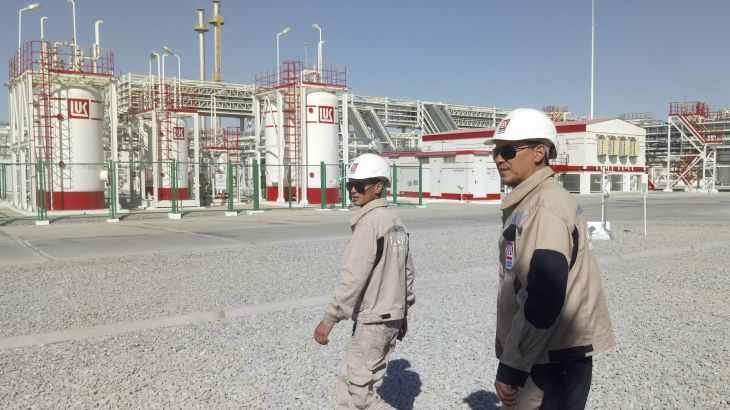Will Putin’s ‘natural gas union’ fail?
Uzbekistan has poured cold water on a potential alliance in another sign Central Asia is keeping Russia at arm’s length.

Kyiv, Ukraine – The Uzbek official sounded like he was talking about his nation’s freedom.
“We will never compromise our national interests,” Energy Minister Zhurabek Mirzamakhmudov told the Kun.uz news website, an Uzbek outlet, on December 7.
Keep reading
list of 3 itemsPutin’s Central Asian allies embrace Russians fleeing draft
‘We want respect’: Putin’s authority tested in Central Asia
“We will not allow any political conditions to be imposed in return” for joining a “natural gas union” with Russia and Kazakhstan, he said.
In late November, Uzbekistan and its ex-Soviet neighbour, Kazakhstan, started discussing the possibility of a “natural gas union.”
In some parts of Uzbekistan, gas supply has not been stable, leading to recent popular protests.
Despite a population of less than 20 million, Kazakhstan is the world’s ninth-largest nation by area; it is slightly smaller than Argentina. Its northern regions are close to Russia and can be easily supplied from its networks of pipelines.
The alliance could help ex-Soviet Central Asia’s largest economies coordinate gas exports and supply to domestic customers.
According to an outline published on November 27, it could also pave the way for close integration – economic, political and defence-related.
Defence is especially important after the invasion of Ukraine – and the veiled threats Kazakhstan received from some public figures in Russia recently.
But the Kremlin immediately decided to step in.
The day after the “union’s” outline was published, Russian President Vladimir Putin told his Kazakh counterpart Kassym-Jomart Tokayev that Moscow should be part of the “natural gas union” that could develop mechanisms to ship natural gas between the three nations – and to China.
Moscow started praising the proposed deal saying that Kazakhstan could save “tens of billions of dollars” by buying Russian gas for its northern provinces instead of building its own pipelines that could stretch thousands of kilometres.
Tokayev’s initial response? Why not.
No integration
Observers say that Moscow is desperate to nip in the bud any form of integration in the strategic region of more than 60 million that stretches between China, Afghanistan, Iran and Russia, which does not directly involve the Kremlin.
“It’s not hard to guess that [Putin’s] initiative was a response to the news that Uzbekistan and Kazakhstan are creating a union that may become a base for sovereign Central Asian integration, especially when it comes to defence,” Alisher Ilkhamov, the head of the London-based Central Asia Due Diligence, a think-tank, told Al Jazeera.
“It didn’t suit the Kremlin,” he said.
Moscow has often intervened in Central Asian affairs.
In 1994, the first Kazakh President Nursultan Nazarbayev came up with the idea of the “Eurasian Union of Nations” that would boost economic ties between his nation, Russia and Belarus.
Moscow eagerly joined it fearing competition with the EU and the US that invested billions in developing Kazakhstan’s untapped oil and gas fields on the Caspian shelf in the 1990s.
Eventually, Russia took over the lead in the Eurasian Union, turning the free trade bloc into a Moscow-dominated alliance.
Impoverished Tajikistan and Kyrgyzstan joined it because millions of their nationals work in Russia, and their remittances keep their motherlands’ economies afloat.
Uzbekistan suspended its membership in 2008.
‘Stay by the main switch’
This time around, the Kremlin has rushed to dissuade Uzbekistan from expressing doubt in the latest “natural gas union.”
“No one is talking” about the political conditions, Kremlin spokesman Dmitry Peskov said on December 8, after Mirzamakhmudov’s outburst.
But history could prove him wrong.
In the 1990s, Moscow managed the flow of natural gas from Central Asia to Europe as it controlled the only pipeline from the region, meaning it could dictate prices until energy-starved China financed a route to its western provinces.
Observers view Putin’s attempt to join the yet-theoretical “union” as a way to again control the flow of gas, from Russia and Central Asia, to China.
“Russia wants to stay by the main switch and keep its influence on the [gas] market while under sanctions, and also don’t let China wean off Russia’s gas pipeline to the Central Asian one,” Kyiv-based analyst Aleksey Kushch told Al Jazeera.
The “union” could also provide a chance to squeeze some Russian gas into the China-funded pipeline from Central Asia.
Moscow’s exports dropped dramatically as Europe decided to wean itself off Russian energy supplies, in response to the invasion of Ukraine.
This year, the European Union started receiving far less Russian gas, imposed a price cap on its oil and embargoed Russian crude oil imports by sea.
Because of Western sanctions, Beijing became the biggest buyer of Moscow’s energy imports.
It nearly doubled the amount of oil, gas and coal it procured from Russia since before the war – and paid some $60bn for them.
In early December, China completed a pipeline that can carry Russian gas to Shanghai.
The China-Russia east-route pipeline will span more than 8,000km (4,970 miles).
The Kremlin wants to sell even more, but Russia’s northwestern gas fields are too far from the existing pipelines to China. They can however be easily linked to the Soviet-era network.
“Moscow is trying to use any tools at its disposal to stake as much of the gas pie in the People’s Republic of China,” Temur Umarov, a Sinologist and expert with Carnegie Politika, a think-tank formerly based in Moscow, told Al Jazeera.
While Russia’s proposal to join the union took Kazakhstan by surprise, Uzbekistan has poured enough cold water on it to thwart the entire idea.
“Tashkent made it clear it wasn’t interested in joining the union,” analyst Ilkhamov said.
In the meantime, Kazakhstan says it is still “evaluating” the proposal – and cites Western sanctions imposed on Russia as the main stumbling block.
“Kazakhstan will not allow its territory to be used to circumvent sanctions,” Kazakhstan’s Deputy Foreign Minister Roman Vasilenko was recently quoted as saying.